|
|
|
Sort Order |
|
|
|
Items / Page
|
|
|
|
|
|
|
| Srl | Item |
| 1 |
ID:
069023
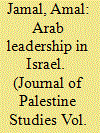

|
|
|
| 2 |
ID:
121500
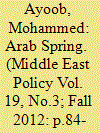

|
|
|
| 3 |
ID:
078752
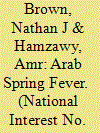

|
|
|
| 4 |
ID:
125384
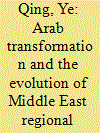

|
|
|
|
|
| Publication |
2013.
|
| Summary/Abstract |
Since its outbreak in the beginning of 2011, the Arab transformation that swept almost the whole middle east has now entered the third year with its geopolitical implications beginning to unfold gradually. When erupted in Tunisia and Egypt, it was driven primarily by internal dynamics and was regarded as a genuine local, bottom up movement in general. Much to people's surprise, incumbent regimes such as the Mubarak regimes in Egypt and Ben Ali regime in Tunisia that were once considered to be durable and formidable were too quick to be overthrown.
|
|
|
|
|
|
|
|
|
|
|
|
|
|
|
|
| 5 |
ID:
129470
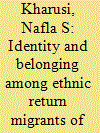

|
|
|
|
|
| Publication |
2013.
|
| Summary/Abstract |
This article explores the nature, construction, and negotiation of identity among Oman's ethnic return migrants called Zinjibaris. Using a social psychological approach, in which ethnic identity is conceptualized as fluid and socially constructed, the study examines how these migrants first define their identity in Zanzibar and then redefine it and forge a sense of belonging on returning to their ancestral homeland. The life stories of four women, representing three generations of returnees, highlight the role played by sociohistorical narratives and Arab descent ideology in constructing a multihyphenated identity-Zinjibari-Omani and Arab-Omani. They also reveal the implications of such an identity positioning for processes of inclusion and differentiation.
|
|
|
|
|
|
|
|
|
|
|
|
|
|
|
|
| 6 |
ID:
132979
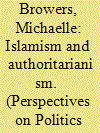

|
|
|
|
|
| Publication |
2014.
|
| Summary/Abstract |
Based on the texts of the five works under review here and what we know about the pace of academic publishing, it is clear that the bulk of the analysis provided in each was written prior to the waves of demonstrations and protests that swept the Arab region beginning in December 2010. One can only imagine how many scholars of Arab politics with books in process were faced with the dilemma of whether a chance to revisit the text was worth delaying publication or mourning the passing of the opportunity to make that decision. The authors of three of the works under review were able to incorporate some analysis of events that were only unfolding as the texts went to press, in prefaces, introductions, conclusions, and codas. The two authors who did not have or take the opportunity to reference the uprisings are no poorer as a result. For the most part, each of these books contributes something important to our understanding of the recent political upheavals and changes that continue to unfold.
|
|
|
|
|
|
|
|
|
|
|
|
|
|
|
|
| 7 |
ID:
119859
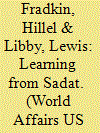

|
|
|
| 8 |
ID:
027663
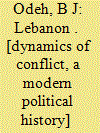

|
|
|
|
|
| Publication |
London, Zed Books Ltd., 1985.
|
| Description |
xvii, 233p.hbk
|
| Standard Number |
086232212X
|
|
|
|
|
|
|
|
|
|
|
|
Copies: C:1/I:0,R:0,Q:0
Circulation
| Accession# | Call# | Current Location | Status | Policy | Location |
| 026563 | 956.92043/ODE 026563 | Main | On Shelf | General | |
|
|
|
|
| 9 |
ID:
117832
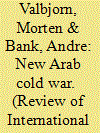

|
|
|
|
|
| Publication |
2012.
|
| Summary/Abstract |
This article provides a conceptual lens for and a thick interpretation of the emergent regional constellation in the Middle East in the first decade of the 21st century. It starts out by challenging two prevalent claims about regional politics in the context of the 2006 Lebanon and 2008-09 Gaza Wars: Firstly, that regional politics is marked by a fundamental break from the 'old Middle East' and secondly, that it has become 'post-Arab' in the sense that Arab politics has ceased being distinctly Arab. Against this background, the article develops the understanding of a New Arab Cold War which accentuates the still important, but widely neglected Arab dimension in regional politics. By rediscovering the Arab Cold War of the 1950-60s and by drawing attention to the transformation of Arab nationalism and the importance of new trans-Arab media, the New Arab Cold War perspective aims at supplementing rather that supplanting the prominent moderate-radical, sectarian and Realist-Westphalian narratives. By highlighting dimensions of both continuity and change it does moreover provide some critical nuances to the frequent claims about the 'newness' of the 'New Middle East'. In addition to this more Middle East-specific contribution, the article carries lessons for a number of more general debates in International Relations theory concerning the importance of (Arab-Islamist) non-state actors and competing identities in regional politics as well as the interplay between different forms of sovereignty.
|
|
|
|
|
|
|
|
|
|
|
|
|
|
|
|
| 10 |
ID:
128212
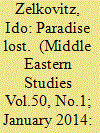

|
|
|
|
|
| Publication |
2014.
|
| Summary/Abstract |
The article discusses the evolution of the Palestinian community in Kuwait in the wake of the 1948 War. The demand for skilled labour facilitated the gradual integration of the Palestinians into Kuwaiti society, especially in the education system and state institutions. In this regard the article examines the role of education and students in creating personal and political socio-economic networks. The relatively liberal political atmosphere in Kuwait during its years of development transformed it into a hotbed for Palestinian political activism. This trend continued up to the 1991 Gulf War, when Yasir Arafat's support of Saddam Husayn in that wa, caused the fall from grace of the Palestinians in Kuwait. This ended the central role that the Palestinians played in the historical process of Kuwait state building. Following the death of Arafat the PLO began to seek reconciliation with Kuwait. At this timely moment in the history of relations between these two communities, the article sheds light on these efforts.
|
|
|
|
|
|
|
|
|
|
|
|
|
|
|
|
| 11 |
ID:
152483
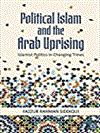

|
|
|
|
|
| Publication |
New Delhi, Sage Publications India Pvt Ltd, 2017.
|
| Description |
xxiii, 339p.hbk
|
| Standard Number |
9789386042194
|
|
|
|
|
|
|
|
|
|
|
|
Copies: C:1/I:0,R:0,Q:0
Circulation
| Accession# | Call# | Current Location | Status | Policy | Location |
| 059017 | 320.55/SID 059017 | Main | On Shelf | General | |
|
|
|
|
| 12 |
ID:
121623
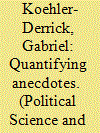

|
|
|
|
|
| Publication |
2013.
|
| Summary/Abstract |
The events of 2011 transformed the politics of the Arab world. In just under 12 months, dictators fell in three countries: Tunisia, Egypt, and Libya. In Bahrain, Yemen, and Syria, protests and violence continued throughout 2012 to shake what were once assumed to be the solid foundations of long-standing autocratic regimes. Although it is too soon to assess the outcome of these events, one immediate consequence is clear: the empowerment of public opinion in Arab politics. For the first time in more than 50 years, the voices of average Tunisians, Egyptians, and Libyans can directly influence political outcomes. This shift may yet prove to be temporary, but its importance in driving current events cannot be discounted.
|
|
|
|
|
|
|
|
|
|
|
|
|
|
|
|
| 13 |
ID:
121613
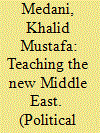

|
|
|
|
|
| Publication |
2013.
|
| Summary/Abstract |
In 2011 the protests in the Middle East and North Africa (MENA) were not only unprecedented in terms of scale and political consequences for the region, they also highlighted a number of long-standing analytical and theoretical misconceptions about Arab politics. In particular, the conventional thesis privileging the idea of a "durable authoritarianism" in the Arab world was partially undermined by a cross-regional civil society that confronted the formidable security and military apparatus of the state. Although in some countries democratic transitions have continued, since they first occurred in Tunisia, other Arab states continue to witness a resilient authoritarianism and strong state repression of civil society activism. These historic events have also set the stage for a new teaching agenda in important ways. Specifically, an agenda for teaching the "new Middle East" must incorporate two important general components: first, a critical review of the influential scholarship on persistent authoritarianism with the objective of addressing past theoretical and methodological misconceptions, and second, the introduction of new conceptual and analytical frameworks relevant to contemporary political developments in the Arab world and the MENA region more generally.
|
|
|
|
|
|
|
|
|
|
|
|
|
|
|
|
|
|
|
|
|